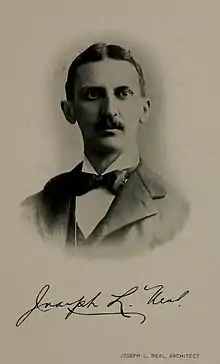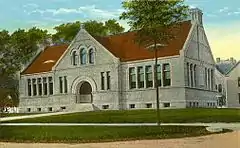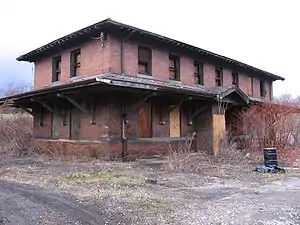Joseph Ladd Neal
Joseph Ladd Neal (1867–?) was an American architect who designed Richardsonian Romanesque, Shingle Style and Colonial Revival buildings.

Joseph L. Neal, circa 1896.
Born in Wiscasset, Maine, the son of a hardware merchant, he apprenticed under Boston, Massachusetts architect Charles Howard Walker. He worked for Shepley, Rutan & Coolidge in Boston and James Renwick, Jr. in New York City, before settling in Pittsburgh, Pennsylvania about 1892. In 1893 he established a partnership with S. Alfred Hopkins, that lasted a year. A partnership with George M. Rowland lasted from 1902 to 1906.[1]
Four of his works – Lithgow Public Library, Merrill Memorial Library, College Hill Station, Small Point Club – are listed on the National Register of Historic Places.
Selected works
- Lithgow Library and Reading Room, Augusta, Maine, 1894–96, with S. Alfred Hopkins. Neal & Hopkins won the commission in a national design competition with 65 submissions.[2]
- First Unitarian Church, Pittsburgh, Pennsylvania, c. 1895.
- Small Point Club, Small Point, Maine, 1895-97.[3][4]
- Morrill Memorial Library, Norwood, Massachusetts, 1897-98.[5] A near-replica of Neal's Lithgow Library.
- Alterations to Beaver County Courthouse, Beaver, Pennsylvania, 1901.
- James Lyall Stuart house, Sewickley, Pennsylvania, c. 1905, with George M. Rowland.[6]
- College Hill Station (Pittsburgh & Lake Erie Railroad), Geneva College, Beaver Falls, Pennsylvania, 1910, John Abiel Atwood, engineer.
 Lithgow Public Library, Augusta, Maine (1894–96).
Lithgow Public Library, Augusta, Maine (1894–96). Merrill Memorial Library, Norwood, Massachusetts (1897–98).
Merrill Memorial Library, Norwood, Massachusetts (1897–98). College Hill Station, Beaver Falls, Pennsylvania (1910).
College Hill Station, Beaver Falls, Pennsylvania (1910).
References
- Joseph Ladd Neal at Small Point Archived 2013-10-21 at the Wayback Machine from Small Point Club.
- "Architects Neal & Hopkins," in The Lithgow Library and Reading Room (Augusta, ME: 1897), pp. 142-43.
- A Centennial History of the Small Point Club (Bath, ME: 1997).
- Small Point Club Archived 2013-02-20 at the Wayback Machine from NRHP.
- 1897 description of Morrill Memorial Library
- "Homes with a History" from Pittsburgh Post-Gazette.
This article is issued from Wikipedia. The text is licensed under Creative Commons - Attribution - Sharealike. Additional terms may apply for the media files.